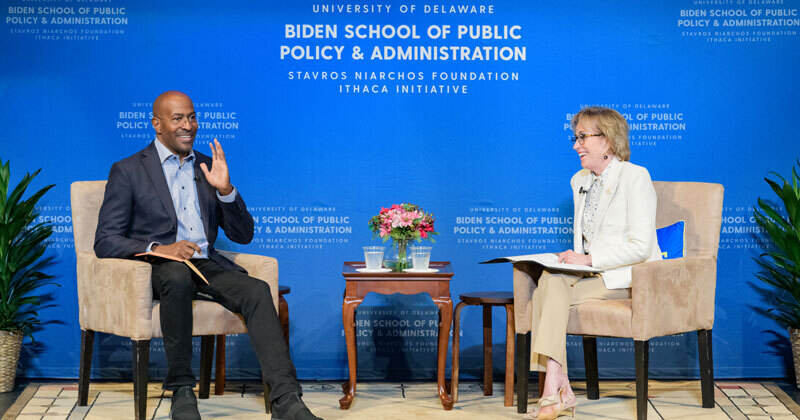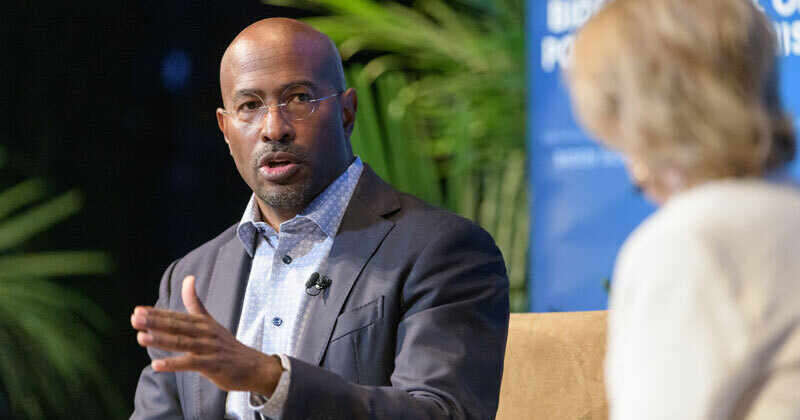
CNN host Van Jones discusses civility, courage and criminal justice reform
Moments before Van Jones took the Mitchell Hall stage May 10 for a conversation with Valerie Biden Owens, chair of the University of Delaware’s Biden Institute, the last delicate notes of a string quartet arrangement of Katy Perry’s “Firework” slowly faded out. Likely a random selection to the pre-conversation playlist, the title was strangely apropos: The thesis statement Jones brought to a mixed crowd of students and community members was that the incessant flames lobbed between the left and the right will only serve to combust and consume. Instead, Jones urged, let us come together in civility and ignite the spark of true bipartisan power in U.S. politics.
The chat was one in a series focused on inspiring and fostering civil discourse via the Joseph R. Biden, Jr. School of Public Policy and Administration Stavros Niarchos Foundation (SNF) Ithaca Initiative, of which Jones is a SNF Ithaca Fellow. Launched in 2021, the SNF Ithaca Initiative aims to empower UD students to be engaged, effective citizens exposed to public servants across the ideological spectrum.
Best known as a CNN host, Obama administration adviser, Emmy Award-winning producer and New York Times best-selling author, Jones was vulnerable as he discussed his lesser-known narrative. He tethered his story fiercely to that of his father, who grew up in “abject poverty” in rural Tennessee in a “shotgun shack,” a property so narrow that all the rooms stacked behind each other. “If someone fired a shotgun into the front door, that bullet would go through every room,” he said.
His father’s refusal to falter was so tremendous that not only did he put himself through college and become a revered public school principal, Jones noted, but he helped anyone who wanted the same.
“The day I graduated Yale, we took a photo of him with his hands raised high,” Jones said. “He said, ‘You’re a ninth-generation American, but the first in our family to be born with all of your rights. Just look at what you’ve done in one generation.’ You could have rolled the credits on my life that day.… Whomever in my family got out of poverty, they did so via a bridge called my father’s back.”
And now Jones is the bridge, laying himself down in the chasm between Democrats and Republicans, and urging each side to take the first few steps toward civility and collaboration.
“But how?” a candid Biden Owens asked, palms upturned. “How do you find common ground? We can all sing Kumbaya and hold hands, but when you know it’s a bad actor smiling you in the face … how?”
Jones unloosened a sly smile. “Well, I wasn’t always like this,” he said.
A far-left activist in the Bay Area in his 20s, Jones said he found himself in the trenches of “urban warfare,” engaged in the fight after the Rodney King beating and California’s draconian Three Strikes criminal legislation. He was a rabble-rouser who eventually burned out. So burdened with depression, he couldn’t even get out of bed.
But it was via that breakdown that Jones broke through.
In an effort to make himself “whole,” Jones wandered out of urban justice and into other sectors; namely, green energy. He started making connections with companies and asking, “Who are you hiring? Because I’ve got a bunch of poor Black kids in Oakland who need work. Why don’t we work together and fight pollution and poverty at the same time?”
“I was able to walk back into those same urban neighborhoods with job offers in my hands instead of protest signs,” Jones said. “And that was a powerful moment, because before then, I was of the mind that if you don’t look like me, if you’re not protesting in these streets, then you don’t give a damn and you are my enemy.”
Two years later, Jones’ effort in California was replicated on a national level when the Green Jobs Act of 2007 was passed.
Jones’ suggestion to those wondering how to walk the divide themselves: Turn off the TV.
Yes, even CNN.

“If you listen to the media, you will come away with the point of view that there are far too many bad people,” Jones said. “Too many MAGA-hat wearing bigots. Too many hyper-woke folks on the left. It’s true that there is an awful-people problem on both sides, but it’s the smallest problem. The biggest problem we have is an awesome-people problem: too many awesome people on both sides who have no idea how to work together.”
Jones recalled going on air on CNN and saying of former President Donald Trump’s son-in-law Jared Kushner, “Kushner is riding his shiny little tricycle in circles around the Oval Office and needs to get a real job.”
But what many might not know is that Kushner’s father went to prison, Jones said. And on a bone-deep level, Kushner wanted to see prison reform.
“So Jared, the same guy who called my boss Jeff Zucker and said, ‘CNN will have no access until you fire Van,’ gets me on the phone and wants to make a deal on prison reform,” Jones said. “Is it everything I wanted to see? No. But this ‘all or nothing’ mentality kills all hope of progress. The biggest secret that you might not all know, because no one in D.C. wants to brag when we work together, is that the Trump White House and I passed the First Step Act, which the Times called ‘the most substantial breakthrough in criminal justice in a generation.’”
Jones is also bridging the divide on the climate crisis via DreamCorps, the bipartisan advocacy body he founded that tackles critical national issues.
“We’re in the reddest jurisdictions in the reddest states, and guess what? Those farmers are impacted by climate, except their elected officials aren’t talking about it,” Jones said. “We put those folks in a room with folks from urban areas who want clean emission public transportation. And what happens is not nuclear. The red-state farmers go, ‘Oh, you want clean-emission public transport? God bless you.’ And the urban folks say, ‘You’re a farmer who wants to be paid to put more carbon in the soil? God bless you. What the hell are we fighting for?’ It’s amazing how much more good we can do for people if we stop looking for the bad in people.”
About the UD Biden School
Established in 1961 and named in 2018 for the University of Delaware’s most distinguished alumnus, the 46th president of the United States, the Joseph R. Biden, Jr. School of Public Policy and Administration prepares students with the knowledge and skills necessary to engage in research and public service activities to improve the quality of life in communities around the world. The Biden School’s faculty, staff, students and alumni create and use interdisciplinary, nonpartisan research and empirically based analysis to inform effective decision-making and policy and to improve leadership and administration. The Biden School, home to the Biden Institute, partners with organizations from all sectors to discover innovative and equitable solutions to the critical challenges of our time.
About the SNF Ithaca Initiative
In the fall 2021, the Biden School launched a new civil discourse and civic engagement pilot program supported by the Stavros Niarchos Foundation (SNF). Called the SNF Ithaca Initiative, the program is named after the home of Odysseus — one of Greek mythology's greatest leaders, whose talent for persuasive discourse was revered in ancient Greece. For Odysseus, Ithaca represents not only the beginning of a journey but the ultimate destination. Likewise, the SNF Ithaca Initiative will serve both as the beginning of our students' journey toward becoming effective citizens and as the ultimate destination for students from across the country to come together and develop the civil civic engagement skills that will strengthen our democracy.
About the Stavros Niarchos Foundation (SNF)
The Stavros Niarchos Foundation (SNF) is one of the world's leading private, international philanthropic organizations, making grants to nonprofit organizations in the areas of arts and culture, education, health and sports, and social welfare. SNF funds organizations and projects worldwide that aim to achieve a broad, lasting and positive impact for society at large and exhibit strong leadership and sound management. SNF also supports projects that facilitate the formation of public-private partnerships as an effective means for serving public welfare. Since 1996, the foundation has committed more than $3.2 billion through over 5,100 grants to nonprofit organizations in more than 135 countries around the world.

